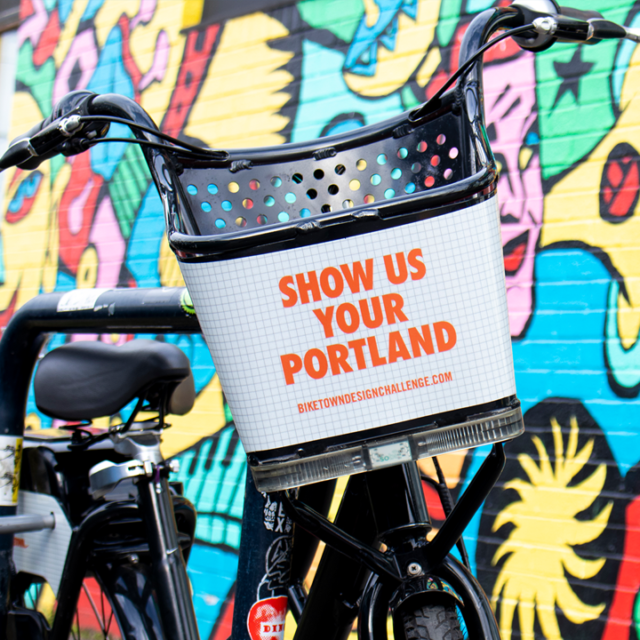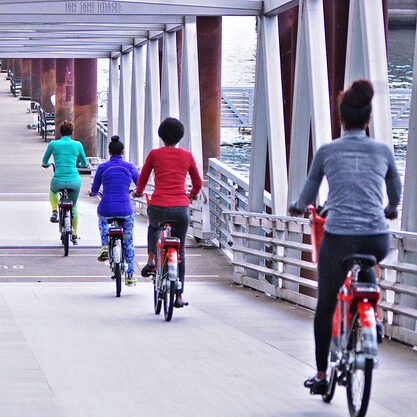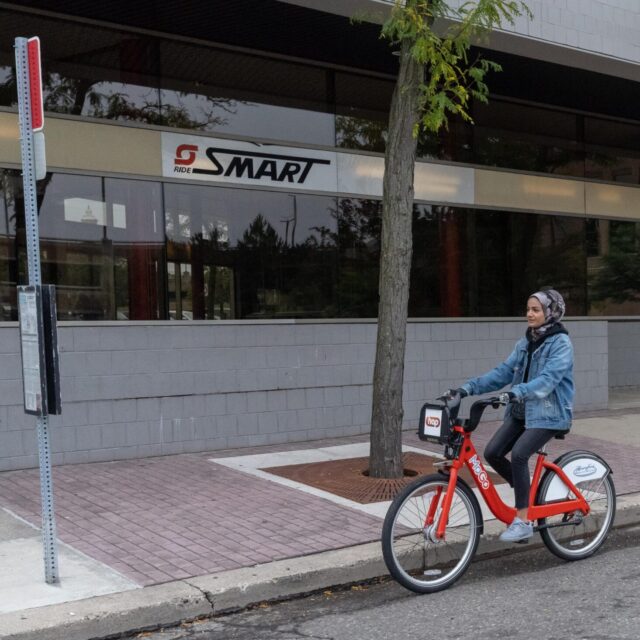Students on Financial Aid Can Now Use Biketown For Free
by Kiran Herbert, Communications Manager
October 13, 2021
That’s just one of several new equity initiatives launched by the bike share system in Portland, Oregon.
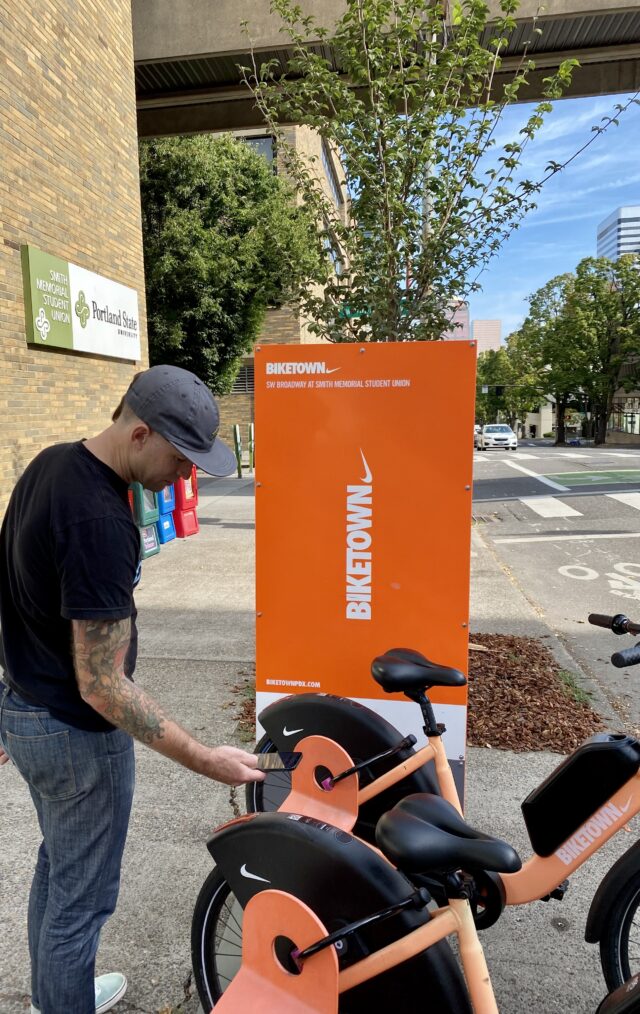
Portland State University Transportation Options Manager Clint Culpepper unlocks a Biketown bike.
In September, Biketown, Portland’s all-electric bike share service, launched several new initiatives geared towards lowering barriers to bicycling for select users. The first offers free memberships to all college students that receive any amount of federal financial aid. Qualifying students from all Portland colleges and universities, regardless of whether or not their school falls in the service zone, need only submit their FAFSA (Free Application for Federal Student Aid) letter when they apply, unlocking an unlimited number of 60-minute rides per month.
The move is part of a larger expansion of the Biketown for All program, which offers reduced rates for residents in affordable housing, as well as those receiving food stamps or other social services. Not only did Portland open up the program to students receiving federal financial aid but it slashed its membership fees from $5/month (plus 5 cents a minute for ride time) to zero. The changes are possible thanks to grant funding from the Portland General Electric (PGE) Drive Change Fund, which supports electric transportation adoption and promotion.
In the month since instituting these changes, enrollment in the Biketown for All program has more than doubled, thanks to a combination of in-person outreach, media coverage and email campaigns.
“Money was the missing piece to making this happen before,” says Roshin Kurian, transportation demand management specialist at the Portland Bureau of Transportation (PBOT). “Our goal for Biketown For All is to reach more and more people—and that just wouldn’t be possible without this life-changing grant.”
Biketown for All memberships now include:
- No monthly fees to ride ($0.00)
- Unlimited 60-minute e-bike rides ($0.05/min after 60 min)
- No unlock fees
- $1 out of hub fees for locking bikes to public bike racks within the service area ($5 outside of service area)
- $7/month in bike credits (to cover things like locking fees)
- Free parking in East Portland Super Hub Zone (East of 72nd Ave)
- 24/7 access to 1,500 e-bikes in the City of Portland
The idea of allowing qualifying college students into Biketown for All came about after a call amongst Lyft’s various bike share markets, which includes Portland, Nice Ride in Minneapolis and Divvy in Chicago. Both Nice Ride and Divvy also offer low-income programs that are available to students receiving Federal Student Aid.
“We learned that Divvy for Everyone had opened up their eligibility to students on financial aid,” says Roshin. “We leveraged that conversation and brought it up during discussions with our local partners.”
One of those local partners was Portland State University (PSU), the largest institute of higher learning in the city. Wanting to further support its students—as well as help alleviate downtown congestion and help combat climate change—the university invested in a new partnership with Lyft and PBOT: All Portland State University students, regardless of whether they’re on financial aid, are now eligible to receive $20 in Biketown ride credit per month.
The median Biketown trip in Portland is 12 minutes long, and since it costs $1 to unlock the bikes and 20 cents/minute to ride, PSU estimates that most students will be able to ride for free about five times a month. Kurian says other schools interested in a similar partnership need only contact Lyft and be willing to offer some financial support.
In Detroit, Wayne State University has subsidized four-hour bus and bike share passes for all enrolled students, as well as full- and part-time employees, allowing them to ride all buses, the local streetcar and MoGo bikes at no cost. Likewise, all students and employees at the University of Pittsburg have access to free 30-minute rides on the Healthy Ride bike share system thanks to a grant from Pepsi and funding from the school’s Office of Parking, Transportation and Services. Boulder BCycle also offers free unlimited bike share passes to students, faculty and staff at Naropa University and full-time students at the University of Colorado Boulder.
Not only do such incentives have environmental benefits but they also reach users at a critical juncture in their lives. College is typically a time of growth and change, of considering new ways of being in the world. By offering e-bikes as a free transportation option, bike share has the potential to convert a whole generation of riders.
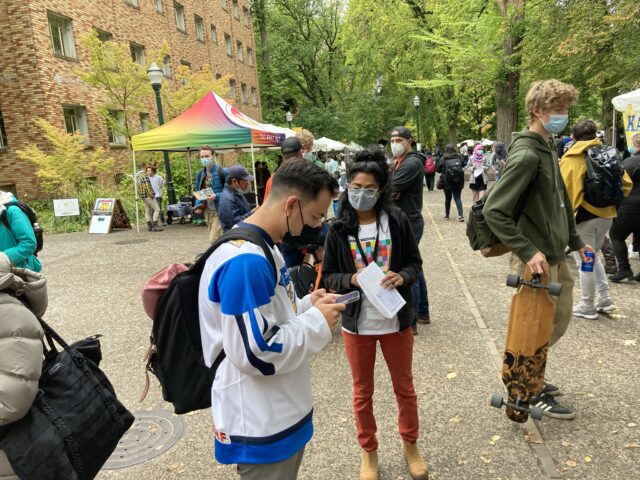
Roshin Kurian helps a student register for Biketown.
“This is a highly motivated group that’s perfect for our transportation demand management magic,” says Kurian. “They understand that getting out of cars will make us healthier and help us achieve our climate goals.”
Kurian also notes that local bike shops are excited about the prospect of getting more people riding e-bikes, as it tends to convert folks into e-bike owners (a fact to which this writer can attest). The bottom line is that anything that gets more people biking is better for the health of our communities and the environment.
“We’re trying to connect transportation to folks living on low incomes, people of color and people that live without as many transportation options in their area,” says Kurian. “These Biketown programs directly connect to our transportation justice goals, which will help us achieve our climate goals.”
The Better Bike Share Partnership is funded by The JPB Foundation as a collaboration between the City of Philadelphia, the National Association of City Transportation Officials (NACTO) and the PeopleForBikes Foundation to build equitable and replicable bike share systems. Follow us on Facebook, Twitter and Instagram or sign up for our weekly newsletter. Got a question or a story idea? Email kiran@peopleforbikes.org.

